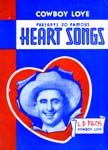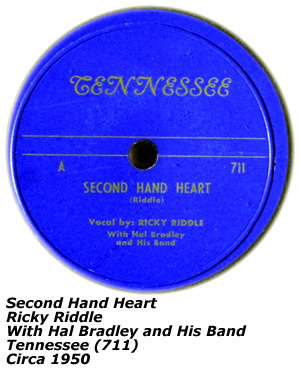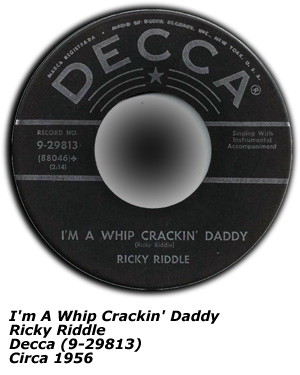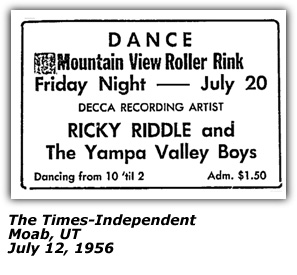



|
 |
|||||||
|
About The Artist
During World War II, Riddle enlisted with the Navy in Chicago, Illinois on December 21, 1941. He served aboard the U.S.S. Adair in the Pacific Theatre. After an honorable discharge / release on July 28, 1945, he returned to Detroit and found a booming country music nightclub scene waiting for him; a result of thousands of new migrants from the South who moved north to build Detroit’s “Arsenal of Democracy.” Riddle pursued the life of a singing cowboy in earnest, writing songs and performing in nightclubs and showcases, sitting in with other entertainers and headlining his own shows. In 1949, Drake’s Record Shop, located on 11500 East Jefferson Avenue, sponsored appearances by Hank Williams, Cowboy Copas and others at the convention center on Woodward Avenue. (On March 27, 1958, the Detroit Free Press reported that a fire of unknown origin destroyed the record shop.) When Riddle’s friend, singer Eddie Jackson, was hired to open for Williams, Riddle shared the stage with him. Riddle was probably living in Nashville, Tennessee, by then.
 
 
Dave Dreyer formed two new firms "for an invasion of the hillbilly music market" in early 1954. The publishing firms, Barnhill Music and Tennessee Music were affiliated with BMI. The Tennessee Music firm was associated with the Tennessee record label. At that time, he had signed two writers, Vic McAlpin and Ricky Riddle. McAlpin was said to be the Nashville representative for the publishing firm. Billboard gave Ricky a decent review of that first Tennessee release. He was backed by the Hal Bradley Band on the recordings. "Second Hand Heart" - "Standout side on a hiterto unheard from label. Song has the makings, warbler projects impressively, and organ-string backing is top notch." b/w "Somebody's Stealin' My Baby's Sugar" - "Ballad in medium bounce is quite up to high standards of flip in all respects and tune has fine novelty potential to boot."
Riddle recorded Robbins’ “Heartsick” for another Tennessee release. He attempted to present Robbins with a recording contract, but the company’s artists and repertoire man passed on the deal. Robbins went on to launch a storied career with Columbia Records in May 1951.
In June of 1953, Billboard readers learned that Ricky was playing a stint at the Swingtown Club in Chicago and also doing guest spots on radio station WLS. The tall, easygoing Riddle persevered, and cut a single for Decca’s subsidiary Coral Records in 1953. Billboard reported that Ricky starred on the Grand Ole Opry on June 27, 1953; Anita Carter was the featured guest. Cash Box reported that Ricky appeared on the Prince Albert portion of the Opry that same time period with Little Jimmie Dickens as the guest star. In the fall of 1953, Hoedown magazine (published by Thurston Moore) was telling readers that Ricky had moved on from Chicago and his WLS appearances and was appearing at the Village Barn in New Market, NJ. His single on Coral (64157) was reviewed by Billboard. "What Would You Do?" - "Riddle sings this novelty-weeper pleasantly, tho he could have got more into the spirit of the tune"
In 1956, Riddle cut two releases for Decca Records. The first featured
“Drivin’ Down The Wrong Side Of The Road,” backed with “I’m A Whip Crackin’ Daddy.”
The single sounded like it was recorded at Owen Bradley’s Quonset hut in Nashville.
The Cash Box magazine gave the two sides a B+ and B rating in March of 1956. Billboard's reviewer
gave the sides a 74 / 73 review score. Cash Box: "Drivin' Down The Wrong Side Of The Road" - Ricky Riddle displays his smooth and polished chords as he debuts for the diskery with a most appealing reading of a delectable romantic bouncer. Could step out. Billboard: "Drivin' Down The Wrong Side Of The Road" - "We better stop and neck or we'll end up in a wreck." Riddle develops this theme in forthright style. A nice side for deejays.Riddle’s second Decca single featured the Anita Kerr Singers for a country-pop production, “The House I Used To Live In,” and a song with religious content (he had cut similar material for the Tennessee label) called “If Jesus Had To Pray (What About Me?).” Billboard's review gave the two sides a 68 and 63 rating. "The House I Used To Live In" (Decca 30280) - A nostalgic ballad. Singer is very much at home in this idiom and this rendition could get some jockey attention. During the 1950's, while living in Nashville, Riddle performed as a guest at the Renfro Valley Barn Dance in Kentucky, and as a guest on the Grand Ole Opry. His parents moved from Michigan to Tempe, Arizona, and Riddle travelled the country, visiting friends and family while singing in nightclubs along the way.
 
With a broad, toothy smile, Riddle had a likeable personality and visited Michigan often, to see his siblings and their families, and check up on musician friends he grew up with in Detroit. While in town, he made the rounds of local radio stations and sat with country music disk jockeys for on-air interviews. At some point during the 1970s, Riddle moved back to Michigan and took a job as a security guard in Hamtramck. Late one night, Riddle walked out the door of a Detroit bar and was mugged. When police found him, he stank of liquor and the officers mistook his condition for simply being drunk. They placed the unconscious Riddle in a jail cell for the night. When he didn’t respond to attempts to wake him in the morning, Riddle was admitted to the Veterans Administration hospital. Doctors found that Riddle had suffered a stroke resulting from a blow to his head; he was paralysed on his right side. Riddle’s brother, E. Marvin Riddle, arranged for him to live at the Clintonview Care Convalescent Home in Clinton Township. Relatives and friends visited regularly. Mentally, Riddle was the same person, but he was unable to sing and play guitar. To cheer him up, a niece often called a local country music station to request Riddle’s records, and they played them late at night when he enjoyed listening to his radio. Research reveals that he married Helen M. Nawrocki on July 7, 1941 in Fulton, Ohio. However, as noted earlier, Ricky enlisted in the U. S. Navy in December of 1941. However, records show that the couple divorced on March 12, 1943. On April 6, 1944, he married Betty Brown in Detroit, Michigan. Riddle passed away on August 8, 1988. His ashes were interned at the top of the hill in St. John’s cemetery in Fraser, Mich. Credits & Sources
Sound Sample—(YouTube Video Format)
Get The Music
|
|||||
| Printer Friendly Version |
|
Recordings (78rpm/45rpm)
| ||||||||||||||||||||||||||||||||||||||||||||||||||||||||||||||||||||||||||||||||||||||||||||||||||||||||||||||||||||||||||||||||||||||||||||||||||||||||||||||||||||||||||||||||
Hillbilly-Music.com
Yes, Hillbilly Music. You may perhaps wonder why. You may even snicker. But trust us, soon your feet will start tappin' and before you know it, you'll be comin' back for more...Hillbilly Music.
Hillbilly-music.com ...
It's about the people, the music, the history.
|
Copyright © 2000—2023 Hillbilly-Music.com
|
||||